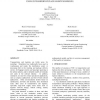Free Online Productivity Tools
i2Speak
i2Symbol
i2OCR
iTex2Img
iWeb2Print
iWeb2Shot
i2Type
iPdf2Split
iPdf2Merge
i2Bopomofo
i2Arabic
i2Style
i2Image
i2PDF
iLatex2Rtf
Sci2ools
100
click to vote
WSC
1997
1997
Panel on Transportation and Logistics Modeling
Transportation and logistics are fertile areas for modeling. Simulation has traditionally been used in warehousing and inside the distribution center or processing hub in the trucking and package delivery sectors, for baggage systems and passenger queueing in the airline industry, and for detailed models of terminals and yards in the railroad industry. In addition, simulators are used for certain specialized applications, such as airspace applications and line-of-road railroad applications. Other non-simulation models based on optimization, networks and heuristics have dominated many other areas of transportation and logistics, especially large-scale supply chain issues such as logistics network design, vehicle routing, facility location, and scheduling. The panel discusses a number of these and other issues: when to use simulation models versus optimization and heuristic models, the features (or lack thereof) in current generation simulation software relevant to transportation and lo...
Related Content
| Added | 01 Nov 2010 |
| Updated | 01 Nov 2010 |
| Type | Conference |
| Year | 1997 |
| Where | WSC |
| Authors | John S. Carson II, Mani S. Manivannan, Mark K. Brazier, Eric Miller, H. Donald Ratliff |
Comments (0)

